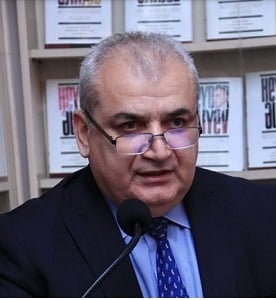
Every year, dozens of high school teachers are left without jobs before reaching retirement age because their employment contracts are terminated due to low scores on certification exams. Teachers protest in front of the Ministry of Science and Education, asking questions: they are specialists with higher education and have performed their duties without complaints for many years. Why is the Ministry suddenly denying them the right to work, and how will they support their families?
The difficult situation in which the Ministry of Science and Education (MSE) places high school teachers concerns Ilham Aliyev, an associate professor at N.Tusi State Pedagogical University. He answered Turan's questions.
* * *
 Turan: Who is responsible for the fact that every year, due to certification results, dozens of educated teachers lose their jobs?
Turan: Who is responsible for the fact that every year, due to certification results, dozens of educated teachers lose their jobs?
I. Aliyev: Teachers taking the certification exams are usually blamed for low scores, and sometimes the educational institutions that issued their diplomas are also blamed. But this is a superficial judgment. Before condemning the teachers and if we want to improve the education level of teachers, we need to delve into the roots of the problem.
It should be understood that the universities that awarded diplomas to these teachers were created and have been managed by the state for decades. The Ministry of Science and Education provided these universities and colleges with educational and methodological resources, educational standards, and investments in this sector. The state and MSE supported the activities of these universities. Then the question arises about the quality and extent of this support.
We need to find out how many grants were issued to universities and colleges over 30 years of state independence. We need to examine the quality and quantity of textbooks for these universities and colleges and their ability to meet educational needs.
Have electronic resources been created for the training of high school teachers, and has the state been interested in the quality of teacher training and monitored the process? Has a strategy for the continuous education of teachers been adopted? Are these colleges and universities accredited, and why is the funding for these institutions much less than needed?
It is necessary to investigate the level of forecasting the demand for teachers in the state and understand the reason for the incredibly large scale of teacher training, which exceeds the country's needs over 30 years. This scale continues even though the demand for teachers has remained unchanged.
Turan: Can these problems be resolved soon so that the next generation of teachers is educated in accordance with the needs of the day?
I. Aliyev: Of course, the MSE must answer these questions if it intends to rectify the current difficult situation. But answers alone are not enough; society demands a quick resolution of urgent problems within the next five years. Additional investments need to be made in the process. Otherwise, the question arises: if the MSE is unable to prepare quality teaching staff for itself, where will qualified teachers for hundreds of specialties needed by the state come from?
Initially, the MSE, which has acted irrationally for 30 years by creating 11 unnecessary branches and thereby lowering the quality of teacher training, must accredit itself. The strategy and state program adopted by the department are of poor quality and have been poorly implemented. Let them first check the level of qualification of their own employees, identify their serious shortcomings, and improve the education level of their staff. Then the problems at lower levels will naturally be resolved.
Otherwise, universities and colleges will continue to supply the country with unqualified personnel because the main department of the sector is mired in its own problems.













Leave a review